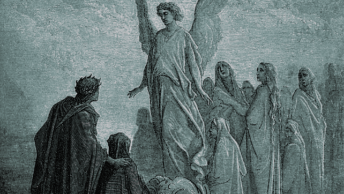Once there was a priest—we’ll call him Father Smith—who heard that the neighboring Catholic parish had a newly-painted mural dedicated to the souls in purgatory; the pastor there commissioned it as a way of reminding his parishioners to pray on a regular basis for those who had died. Father Smith went to the church to see the mural, and discovered to his great shock that his own face was painted on one of the suffering souls. He couldn’t believe his eyes at first, but it was unmistakably him. Furious, Father Smith rushed to the studio of the artist responsible for the mural and demanded that it be changed without delay—in effect, removing him from purgatory. However, the artist—himself a Catholic—said in response, “Father, I once heard you preach in an eloquent All Souls’ Day homily that all who die without having made satisfaction for their sins shall suffer the pains of purgatory until the stain of their sins is completely removed. Now, over a year ago, I did some work at your church for which I have not yet been paid. I intend to leave you in purgatory forever unless you see to it that I am paid in full.” Father Smith was stunned into embarrassed silence, and he left the studio without saying anything—but soon afterwards the artist received full payment, and he thereupon changed the mural so as to show Father Smith ascending into Heaven after having made full restitution for his sins (Rev. Francis Spirago, Anecdotes and Examples for the Catechism, p. 430). If human standards are sometimes very strict, that is even more so with regard to the justice of God. Our Heavenly Father’s immeasurable mercy and love for sinners should not make us complacent. God wants and expects us to become perfect so that we may forever dwell in His presence. This is an impossible goal from a purely human perspective—but through the Lord’s grace, all things become possible.
More than at any other time in the last 2000 years, our age has extremely low standards for moral behavior; many lukewarm and even very sinful people nevertheless consider themselves to be “good persons,” and a common assumption among Christians—even among Catholics who should know better—is that almost everyone goes to Heaven immediately upon dying. Our readings for the Sixth Sunday in Ordinary Time tell a very different story. The Book of Sirach (15:15-20) reminds us that God sees and knows everything we do, and that our moral choices have lasting consequences; by the way we live, we are choosing either good or evil, spiritual life or death. St. Paul (1 Cor 2:6-10) mentions that truth is part of the mysterious wisdom of God—one quite different from the so-called wisdom of the world. Our society tends to focus on the here-and-now, and on worldly pleasures that will not last; true followers of Jesus, however, are called to keep their focus on eternity.
In the Gospel of Matthew (5:17-37), Our Lord urges us to take our spiritual and religious duties very seriously. It’s quite tempting to ignore or downgrade those commandments and moral teachings of the Church we don’t like or find difficult, but Jesus warns that not even the smallest part of a letter of God’s law will pass away until the end of the world, when all is fulfilled. If we make moral compromises, look for religious shortcuts, or seek the easy way out, we will not be ready to enter Heaven immediately upon dying. The same thing is especially true if we have murderous and hateful thoughts even though we don’t actually do physical harm to someone, or if we give into lustful thoughts without acting upon them, or if we nurse a grudge against a brother or sister in Christ while supposedly worshipping God at Mass. When Jesus says, “Settle with your opponent quickly while on the way to court . . . [or] you will not be released until you have paid the last penny,” He means we would be very wise to make reparation for our sins and do penance for them now, while it’s relatively easy here on earth, rather than waiting to do this after we die.
Most Protestants don’t believe in the reality of purgatory, and many Catholics don’t like to think about it because it can be an unpleasant subject. However, the Church has always taught that it exists—and, if understood in the right manner, it’s actually a sign of God’s merciful love. Scripture teaches us that nothing with even the slightest taint of impurity can enter into and dwell in God’s presence (Rev. 21:27). Are any of us so arrogant and foolish as to claim we’re perfectly holy and without sin? Even the saints—except for the Virgin Mary—weren’t free of all sin, but by their holy lives they fully accepted God’s mercy, and by their good deeds allowed His grace to heal them of the harm their sins had caused to themselves and others. If we imitate their example, we too can be completely ready for Heaven by the time we die—but if not, we’ll be allowed the time we need in purgatory to be completely healed and cleansed and perfected. If God demanded we be absolutely free of all sin by the time we die in order to live with Him, very few people would ever make it to Heaven (and if there’s no purgatory, the alternative is too terrible to contemplate). Because of His mercy, and His divine knowledge of human nature, the Lord allows good but imperfect people—presumably the majority of human beings throughout history—the chance to continue their spiritual growth after death in purgatory, so as not to miss out on the eventual joys of eternal life.
For this reason, our very difficult and challenging Gospel is also a message of good news. We can respond to Our Lord’s words by asking the Holy Spirit to show us our hidden faults, by using a thorough examination of conscience to review our lives, by honestly admitting our faults—even the smallest ones—and asking the Lord’s forgiveness, by receiving the Sacrament of Reconciliation on a regular basis, by only receiving Holy Communion when we’re in a state of grace, by humbly accepting correction from those who know us well or who have authority over us, by forgiving others so that we may be forgiven, by making sure Jesus is truly at the center of our lives, and by offering our prayers and sacrifices not only in reparation for our own sins, but also on behalf of those who now suffer the painful but cleansing process of purgatory. Because of our sinful human nature, sometimes harsh and challenging words are the truest sign of love—and that’s the case with the warnings Jesus gives us today. Every decision we make potentially affects our eternal destiny, and the Lord wants us to express our faith in His love and mercy by choosing wisely and by trusting in Him completely.








